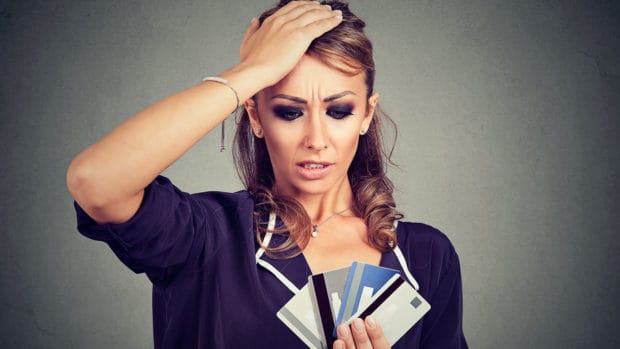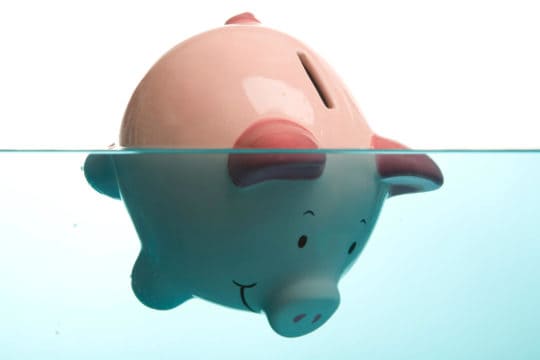Americans Owe More Than $1 Trillion on Their Credit Cards – And Struggle to Pay it Back.
Credit card debt has surpassed $1.17 trillion, says the The Federal Reserve Bank of New York in its “Quarterly Report on Household Debt and Credit”.
Americans have racked up more than $24 billion on their credit cards in the past three months. Credit card delinquency rate – payments late by 90 days or more – have risen past pre-pandemic levels. That may not sound alarming right away. But everyday expenses cost 1.87 times more than they did back then.
Delinquency rates are rising at a pace that “worries New York Fed researchers.” It also worries Debt.com’s chairman Howard Dvorkin, CPA. In this video, Dvorkin explains what’s causing credit card balances and delinquency rates to rise:
Click here for full audio transcript
0:00recently the New York fed announced that
0:02we have about 1.14 trillion in credit
0:06card debt which is a new record what
0:08does that mean for Americans what that
0:11means is that it the debt the overall
0:16credit card debt is
0:18escalating simply because people can’t
0:21afford to live off just their salaries
0:25and they’re using credit cards as a form
0:28of supplemental income to pay for stuff
0:31that they can’t afford challenging part
0:35is that I don’t see that stopping
0:37anytime soon do you think that’s why
0:39we’re seeing such a surge in credit card
0:42balances I think truthfully The Surge is
0:45due to the inflation that we’ve
0:48experienced um and that was
0:52self-inflicted the overall cost of
0:55everything has gone up maybe by 50%
1:00I mean have you gone out to dinner
1:02lately the same
1:05restaurant that you used to go to and
1:08you would have a $50 meal is now
1:12$70 and that is an incredible challenge
1:16for a lot of people and a lot of
1:17families right and and by the way even
1:21if inflation disappeared tomorrow that
1:24restaurant is not going to reduce their
1:28pricing they already took the hit of
1:30people being mad at them their customers
1:33oh I’m not coming here again they
1:35already take took the hit that ship has
1:37sail right a lot of businesses are
1:39starting to go out of business a lot of
1:42restaurants certainly are going out of
1:44business huge
1:45chains can’t afford to stay open anymore
1:49so there’s been a phenomenon recently
1:51called Revenge spending where uh not
1:54even just the younger generation a lot
1:56of people a lot of Americans are
1:57spending more on travel dining like you
2:00said um all of these like entertainment
2:02and things what do you think would be
2:04the best way to get revenge on Revenge
2:08spending stop buying stupid stuff that
2:12you can’t afford that’s the best way to
2:15get a re to get your revenge listen
2:20people were cooped up in their houses
2:22they were told they can’t go anywhere
2:24they were told they can’t go to
2:26restaurants they can’t go on
2:28vacation and now they’re making up for
2:30lost time and they’re like I deserve it
2:33I need to go on
2:35vacation the fact of the matter is the
2:38one thing they’re not looking at is how
2:41much it costs right and that same plane
2:43ticket before the pandemic which cost
2:47$200 is now $4 to
2:50$500 each way I mean it is
2:54astronomical how much it’s crazy travel
2:58is costing and then the hotels hey man
3:02this is good time so it’s a good time to
3:04be a hotel owner because they could
3:06charge a lot of money they’re banking on
3:09M they’re banking it but unfortunately
3:11it’s going on the people’s credit cards
3:14yeah which is scary on the subject of
3:17credit card debt delinquencies are also
3:20on the rise too can you tell me a little
3:23bit about like the biggest factor that
3:25you think is contributing to credit card
3:28delinquencies inflation
3:30the problem is Americans are getting
3:33choked by the debt that they’re carrying
3:36and if you think about
3:38this you have a mortgage so you’re going
3:41to pay for your roof over your head you
3:43have a car payment you’re going to pay
3:46for your car so you could get to work to
3:48make money food yeah those are the three
3:52things that people are going to try not
3:56to default on do you think inflation is
3:59also inflating people’s minimum minimum
4:02payments as well they’re Rising well the
4:05interest rates are inflating people’s
4:08minimum payments so that is increasing
4:13but the interest rates were always high
4:16right even when the government was so
4:18nice to or the Fed was so nice to lower
4:22the bank lending rate and lower the
4:25amount that the banks borrowed at they
4:28didn’t pass those
4:30savings on to the United States consumer
4:34right they kept that so if your interest
4:37rate was at 22% on your credit card I’ll
4:41bet you you didn’t see a drop and if you
4:45did it was a very minor drop so what
4:48advice would you give to somebody to
4:50avoid falling into this trap credit card
4:53debt
4:55delinquencies give me your best advice I
4:58mean listen when people ask me that
5:00question I’m pretty old
5:02school a if you can’t afford it don’t
5:06buy it so don’t whip out that credit
5:09card and if you do whip out that credit
5:12card when that bill comes in make sure
5:15you pay it off right do not pay minimum
5:18payments pay triple your minimum
5:21payments minimum payments is a Fool’s
5:24game it’s meant to keep you in debt and
5:28and and you’re not going to get anywhere
5:30minimum payments typically
5:3375% of minimum payments Sydney goes
5:37towards
5:38interest and you know what 25% goes
5:42towards principal if you’re lucky if
5:45you’re lucky you’re going to be in debt
5:47a long long time playing the minimum
5:50payment game so don’t do that don’t get
5:53trapped it’s a it’s not to your benefit
5:56the bank is not your friend
6:00they want to get you in debt and keep
6:03you in debt because that’s how they make
6:05their money well thank you for that
6:07advice I feel like I’m talking to my mom
6:09or my dad hopefully not your mom
6:14[Music]
What is credit card delinquency?
Credit card delinquency happens when you don’t make the minimum required payment on your credit card by the due date. Delinquent credit card debt is just a fancy name for past-due debt or overdue debt. It basically means that you’re behind and you need to catch up.
How credit card delinquency works
The impact of past-due credit card debt gets worse the longer the balance remains delinquent. A balance that’s only a few days overdue will only have a minimal impact on your finances in the form of late fees. But a balance left unpaid for more than 30 days will start to affect your credit.
Here’s how it works…
If you don’t pay the required minimum payment by the billing due date, your credit card is considered past-due. The credit card company will immediately apply late fees.
- The maximum late fee, if you’ve never missed a payment before, is $25.
- If you’ve missed a payment within the past six months, the late fee can be up to $35.
Once your bill is more than 30 days late, it’s considered a missed payment. Now you are 30 days delinquent.
- By law, the creditor can now report the credit card delinquency to the credit bureaus. However, most credit card companies will not report the delinquency until you have missed the payment by 60 days.
Things get worse once your balance is more than 60 days delinquent. If you haven’t made a payment in two months, two things will happen:
- The credit card company will report the delinquent account to the credit bureaus, the missed payments will show up in the credit history section of the account on your credit report.
- The creditor will also start to apply penalty APR. These rates are much higher than your standard interest rate. Penalty interest rates average 29.99%.
Once the credit card company starts reporting delinquent payments to the credit bureaus, you must catch up and bring your account current to fix your credit history.
If you continue to miss your payments, you have nine months where the account will remain delinquent. After nine months, the creditor will charge off your account. The account will be frozen and sent to either an in-house collections department, or it will be sold to a third-party debt collector.
Digging out of the credit hole caused by delinquent credit card bills
Although creditors offer some leniency when you’re late initially, once they start reporting credit card delinquency to the credit bureaus, you end up in a hole. And digging out of that hole can be tough, especially when your finances are already distressed.
To stop past-due credit card debt from appearing as negative information on your credit history, you must pay the full delinquent amount to bring your account current. In other words, once you’re behind your credit history will stay behind until you catch up. Even if you make a payment, it won’t show that you did in your credit history. It will still show as delinquent.
This can have a huge negative impact on your credit score. Every month where the payment is listed as delinquent will ding your score. So, month after month, your credit score will take damage until you catch up.
How to pay off delinquent credit card debt
It’s never too late to notify your creditor you’ve suffered a financial hardship. Ask if they can lower your interest rate, remove the fees, or set up a payment plan.
If the financial hardship you faced was only temporary, then you need to make catchup payments. This involves paying as much of the delinquent balance on the line of credit as quickly as possible.
For example, if your account became past due because you lost your job, once you get a new job you need to dedicate as much money as you can to bring your account current.
If the financial hardship you’re facing is more long-term or caused by budget issues, then you may need to take more aggressive measures to catch up with your credit card bills. The first thing you should do is call a nonprofit consumer credit counseling agency. This is a free service that can help you identify the best way to get out of debt for your unique financial situation. You will have three primary opinions.
Debt management program
If you fall behind on payments, you typically need to pay all of the money you owe before your account becomes current on your credit report. A debt management program fast tracks that process. Most creditors will agree to bring the account status current after only three payments on the program. This means a debt management program can get you out of debt faster and ensure less damage to your credit score.
If you only have a few delinquent credit card accounts, but the rest are current, the credit counselor will usually recommend this option. A debt management program is essentially a professionally assisted debt consolidation plan that repays your debt faster than you can with minimum payments.
Debt settlement program
If you have a lot of accounts that are behind and even some that are already charged off, then you may be better off with a debt settlement program. This focuses on getting you out of debt for a percentage of what you owe.
Past due accounts continue damaging your score, so the faster you bring them up to speed, the better. Settling collections could free up cash to bring your past-due accounts current. Or you may decide to settle everything to get out of debt quickly, so you can focus fully on rebuilding once you’re out of debt.
Pre-bankruptcy counseling
The credit counselor will also discuss bankruptcy if you’re facing severe financial hardship. They may recommend pre-bankruptcy counseling.
If you need help managing your delinquent credit card debt, you can get it today. Reach out for a free consultation and personalized plan for managing your debt.













